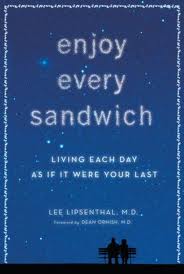How would you live if you weren’t afraid to die?
I’ve fantasized about this. Yes, I am weird but you knew that already. As we get older, we tend to consider these existential questions, so I ask you: What if you lived every day completely unafraid of dying? This is the premise of a very enjoyable and thought-provoking new book, Enjoy Every Sandwich, by the late Dr. Lee Lipsenthal, a colleague of Dr. Dean Ornish who did the intro.
 Dr. Lee, who loved rock and roll, borrowed the name of his book from a Warren Zevon album. Lee was a guy with a positive outlook, doing good work at the Preventive Medicine Research Institute in California where he helped empower even very sick people to live life fully. Then he received a grave diagnosis, but he never freaked out, and his family and friends wanted to understand why. The book is the answer to that question.
Dr. Lee, who loved rock and roll, borrowed the name of his book from a Warren Zevon album. Lee was a guy with a positive outlook, doing good work at the Preventive Medicine Research Institute in California where he helped empower even very sick people to live life fully. Then he received a grave diagnosis, but he never freaked out, and his family and friends wanted to understand why. The book is the answer to that question.
Like me, Lee was raised to be afraid of everything, sure that disaster loomed around every corner. He says of his well-intended, Depression-era parents, “Maybe they came by their anxieties honestly, but they honed them to an art!”
“My parents taught me to look for stress in life. I now realized that looking for stress creates stress. The harder I looked, the more I found.”
So he changed his awareness. “If I looked for fun, joy and playfulness, I would find it. If I looked for trouble, stress and heartache that was what I would find.” He also began a lifetime study of meditation, which can change the physiology of the human brain so one produces fewer stress hormones. This in turn benefits blood pressure and circulation; improves respiratory function; reduces the perception of pain and body discomfort; lowers the risk of artery blockage; decreases heart rhythm disturbances and risk of heart attack; modifies fear and anxiety reactions and enhances immune system function. Not bad for twenty minutes a day.
“Meditation also helped me see that my expectations were just stories that I was telling myself about life. I became free of what life was supposed to be and able to enjoy life as it was.”
I felt empowered by his thoughts. For example, “Our bodies have an incredible capacity for self-healing. We have an intricate and complex immune system that knows what to do with cancer.” The more healthfully you deal with stress, the more your body is able to do its thing. And one of the best ways to deal appropriately with stress is meditation.
To be honest, Lee loses me a bit when he delves into his perception of past lives, although many readers will find it delightful, because there’s enough evidence there to think he isn’t just kidding! He included it to suggest we should open our minds and hearts to the idea that we don’t know everything, so we should give ourselves over to the joy of the “what if?” It also explains why he wasn’t freaked out about dying, and by extension, why we don’t need to be either.
I do wish he had explained why, given that he had only a 10% chance of beating his type of cancer, he chose to be ravaged by chemo and radiation instead of taking a pass and enjoying the time he had left? In the end, does that undercut his message?
I don’t think so. Even if a man blinks when staring into the dark maw of Death, I still buy Lee’s message that we should try harder to live in the present, suffused with gratitude. I recommend Enjoy Every Sandwich and I wish his family peace.
Contest and disclosure: I was invited to review this book, and in return for my honest impressions, the publisher promised to send one of my readers two free copies plus a $25 gift card. I will forward that bounty to whoever answers this question in the most interesting way before January 6, 2012:
Do you believe that, after we die, our souls reappear on earth in the form of another human? If you do, tell us why.







Recent Comments